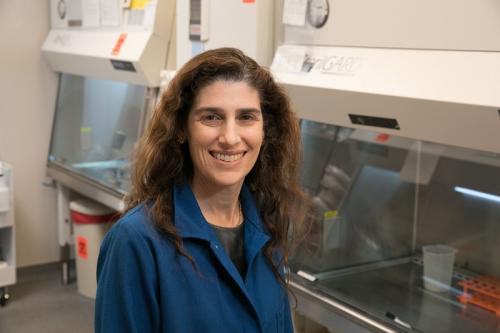
Investigators study how a protein factor involved in making messenger RNA molecules also contributes to cancer cell migration
UCLA researchers have discovered a new protein factor that contributes to a fibroblast cell’s ability to migrate to a wound and participate in its healing process. The study’s results could help scientists prevent cancer cells from using the same mechanisms to move throughout the body and spread.
BACKGROUND
In response to a wound, fibroblasts (cells found in connective tissues of the body), are activated to migrate toward the wound and spread, which contributes to the healing process. While non-dividing, quiescent fibroblasts are found in normal unwounded skin, when skin is wounded, molecular changes take place that give fibroblasts the ability to migrate toward the wound and heal it.
Previous studies with microarrays have shown that proliferation and quiescence are associated with a major reprogramming of gene expression patterns. These gene expression changes are key for quiescent cells to reenter the cell cycle and molecular changes in response to a wound are important for the role of fibroblasts in healing. When genes are expressed, the mRNAs (or messenger molecules) that connect the genetic material in the DNA to proteins need to be processed from their initial to final form. Little was known about whether the processing of RNA molecules is important for cell migration.
METHOD
To understand how fibroblast cells migrate, the UCLA researchers utilized high throughput RNA Sequencing, imaging, primary human cells isolated from skin, cancer cell lines, and mouse modeling. They found that proliferating cells adjacent to wounds express higher levels of cleavage and polyadenylation factors (proteins that mark the end of mRNA molecules) than quiescent fibroblasts in unwounded skin. When fibroblast cells were deprived of one of these cleavage and polyadenylation factors, they migrated at a slower rate.
IMPACT
Cancer cells rely on cleavage and polyadenylation factors to migrate, similar to normal non-tumorous proliferating fibroblast cells that participate in the healing process. By upregulating genes involved in mRNA processing, including cleavage and polyadenylation factors, cancer cells may be more able to migrate, invade and metastasize. This finding about cancer cells may offer scientists new ways to understand how cancer spreads, which could lead to innovative therapies for patients.
“We found that cleavage and polyadenylation factors are functionally important for fibroblast cells to migrate,” said Hilary Coller, associate professor of biological chemistry and molecular, cell and developmental biology, member of the UCLA Eli and Edythe Broad Center of Regenerative Medicine and Stem Cell Research and the UCLA Jonsson Comprehensive Cancer Center Gene Regulation Program. “These same factors are elevated in proliferating fibroblasts, and affect migration in cancer cells as well. The data from our study, taken as a whole, provide a deeper understanding of the role of mRNA processing in the close association between proliferation and migration.”
AUTHORS
The study’s first author is Mithun Mitra from the department of molecular, cell and developmental biology at UCLA. Other authors include, from UCLA, Vinay S. Swamy, Lois E. Nersesian, Daniel G. Taylor, Aaron M. Ambrus, David Jelinek, Hilary A. Coller and David C. Corney from Princeton University and UCLA. From Princeton University, Elizabeth L. Johnson, David G. Robinson, Sandra L. Batista and Wei Wang.
JOURNAL
This story was published online on Oct. 25, 2018, in Genome Biology.
FUNDING
The research was supported by the Rita Allen Foundation, National Science Foundation, National Institute of General Medical Sciences, National Institute of Arthritis and Musculoskeletal and Skin Diseases, Pharmaceutical Research and Manufacturers of America Foundation, National Science Foundation, National Institute of General Medical Sciences, Eli and Edythe Broad Foundation, Iris Cantor Women’s Health Center, National Institutes of Health, Leukemia and Lymphoma Society, Eli and Edythe Broad Center of Regenerative Medicine and Stem Cell Research, University of California Los Angeles, National Cancer Institute, National Institute of Arthritis and Musculoskeletal and Skin Diseases, Cancer Research Institute, Melanoma Research Alliance, Division of Cancer Epidemiology and Genetics at the National Cancer Institute.
